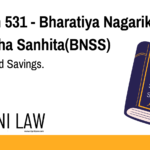Code: Section 141 BSA
(1) When either party proposes to give evidence of any fact, the Judge may ask
the party proposing to give the evidence in what manner the alleged fact, if proved, would
be relevant; and the Judge shall admit the evidence if he thinks that the fact, if proved,
would be relevant, and not otherwise.
(2) If the fact proposed to be proved is one of which evidence is admissible only upon
proof of some other fact, such last mentioned fact must be proved before evidence is given
of the fact first mentioned, unless the party undertakes to give proof of such fact, and the
Court is satisfied with such undertaking.
(3) If the relevancy of one alleged fact depends upon another alleged fact being first
proved, the Judge may, in his discretion, either permit evidence of the first fact to be given
before the second fact is proved, or require evidence to be given of the second fact before
evidence is given of the first fact.
Illustrations.
(a) It is proposed to prove a statement about a relevant fact by a person alleged to be
dead, which statement is relevant under section 26. The fact that the person is dead must be
proved by the person proposing to prove the statement, before evidence is given of the
statement.
(b) It is proposed to prove, by a copy, the contents of a document said to be lost. The
fact that the original is lost must be proved by the person proposing to produce the copy,
before the copy is produced.
(c) A is accused of receiving stolen property knowing it to have been stolen. It is
proposed to prove that he denied the possession of the property. The relevancy of the
denial depends on the identity of the property. The Court may, in its discretion, either
require the property to be identified before the denial of the possession is proved, or permit
the denial of the possession to be proved before the property is identified.
(d) It is proposed to prove a fact A which is said to have been the cause or effect of a
fact in issue. There are several intermediate facts B, C and D which must be shown to exist
before the fact A can be regarded as the cause or effect of the fact in issue. The Court may
either permit A to be proved before B, C or D is proved, or may require proof of B, C and D
before permitting proof of A.
Explanation of Section 141 BSA
Section 141 of the Bharatiya Sakshya Adhiniyam (BSA), 2023, governs the admissibility of evidence in judicial proceedings. It gives the Judge the authority to determine whether proposed evidence is relevant and should be admitted.
This section ensures that only evidence which logically and legally relates to the case is allowed during the trial. It also introduces a structured approach when the admissibility of one fact depends upon the prior proof of another.
Key Provisions:
- Judges have the authority to question the relevance of evidence before allowing it to be submitted.
- If a fact can be proved only after establishing another supporting fact, the supporting fact must usually be proved first.
- Judges may, at their discretion, allow the primary evidence first and require the foundation to be proved later, depending on the context.
Illustration
- A party wants to introduce a dying declaration under Section 26 BSA. Before the statement is admitted, the party must first prove that the person is, in fact, deceased.
- If a party wishes to submit a photocopy of a document, they must prove that the original has been lost before the court accepts the copy.
- In a theft case, if the accused denies possessing stolen property, that denial is only relevant if the property can first be identified. The Judge can choose to allow the denial to be introduced first or wait for the property to be identified.
Common Questions and Answers
Q1. Who decides whether a piece of evidence can be admitted in court?
The Judge. Under Section 141 BSA, the Judge is the sole authority to determine the admissibility of evidence based on its relevance.
Q2. What happens if a fact depends on another fact?
The court usually requires the foundational fact to be proved first. However, the Judge has discretion to allow the primary fact to be presented before the secondary fact, depending on the situation.
Q3. Can a Judge reject evidence outright?
Yes. If the Judge believes the evidence, even if proved, is not relevant, they are obligated to reject it.
Q4. Is there flexibility in the order of proving facts?
Yes. The Judge may allow flexibility in the order of proving interdependent facts, especially where it aids in the smooth conduct of the trial.
Q5. What is the significance of Section 141?
Section 141 helps prevent irrelevant or prejudicial material from entering the record and ensures that evidence is presented in a structured and logical sequence.
Conclusion
Section 141 of the Bharatiya Sakshya Adhiniyam empowers Judges to maintain the integrity of the trial process by controlling the admissibility and sequencing of evidence. By emphasizing relevance and logical sequencing, this provision ensures that trials are conducted fairly and efficiently.
For more detailed analysis of legal provisions under Indian evidence law, visit ApniLaw.













